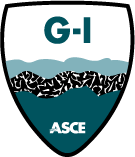Abstract submission for the ICSE-10 is now closed.
If your abstract was accepted you should have received an e-mail with a link to an additional form to upload your paper and signed consent to publish form. If you have not received this email, please contact Kelly Cabal: [email protected].
To download the paper template (word document) and consent to publish form, please visit: www.calgeo.org/icse2020
ICSE PAPER FORMATTING INSTRUCTIONS (PDF)
ISSMGE PUBLICATION AGREEMENT (PDF)
Topics
The conference invites you to submit abstracts that address scour and erosion related to the following topics:
- Track A: Mechanics of Internal Erosion. Including sub-topics such as mechanisms, field studies and observations, theoretical assessment of internal erosion mechanisms.
- Track B: Sediment Transport: Grain Scale and Continuum Scale. Including sub-topics such as advancement in sediment transport theories, tools, and new data sets for the understanding of sediment particle motion at both grain scale and continuum scale, and the implications for scour.
- Track C: Effects of Geology on Internal Erosion. Including subtopics such as anisotropy, heterogeneity, random field analysis, field investigations versus actual conditions.
- Track D: Rock Scour. Including sub-topics such as theoretical, computational, laboratory, and field studies on rock scour processes. Spillway and stilling basin erosion.
- Track E: Erosion and Structures. Including sub-topics such as bridge scour, internal erosion along structures, erosion around foundations, physical processes controlling the local scour around structures; interactions among fluid flow, sediment, and structures; new techniques and designs to alter the flow and scour processes.
- Track F: River, Coastal, Estuarine and Marine Scour and Erosion. Including sub-topics such as scour and erosion research and case studies specific for the riverine, coastal, estuarine and marine environments.
- Track G: Numerical Modelling of Scour and Erosion. Including sub-topics such as advanced computing techniques, numerical schemes, novel approaches for data assimilation, uncertainty quantification and analysis. Field and laboratory scale.
- Track H: Physical Modelling of Scour and Erosion. Including subtopics such as scale models, flume tests for internal and surficial erosion, centrifuge testing, small and large-scale testing.
- Track I: Erosion Monitoring and Measurement. Including subtopics such as novel sensors and instruments, subsurface monitoring, underwater monitoring, innovative techniques, interpretation methods and data processing techniques for monitoring and measuring scour and erosion across spatial and temporal scales.
- Track J: Watershed Scale Soil Erosion, Restoration, and Conservation. Including sub-topics such as technology, management, and policy for the control of soil erosion at watershed scale including effect of land use change, riparian buffer construction to reduce sediment input, reservoir sedimentation and management.
- Track K: Scour and Erosion Countermeasures and Mitigation. Including sub-topics such as applications of both traditional and emerging countermeasures to scour and internal erosion problems.
- Track L: Geo-Hazards Induced by Scour and Internal Erosion. Including sub-topics such as debris flows, landslide, bank erosion, river meandering, and their impact to infrastructure.
- Track M: Erosion Risk Assessment. Including sub-topics such as assessment methods, risk assessment methods, mitigation methods, monitoring.
- Track N: Case Histories, Lessons Learned, and General Practice. Including practical aspects and lessons learned on technical topics in Tracks A through K such as success and failures related to innovative solutions, construction experience, field observations, etc.
- Track O: Impact and Adaptation: flooding, drought, and scour in a changing climate. Including sub-topics such as changing patterns of flooding and drought due to changing climate, potential effects of changing climate on scour prediction
